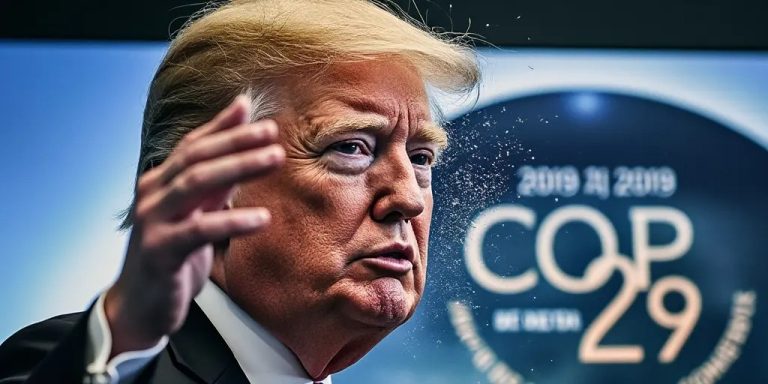The global climate circus, officially known as the 29th United Nations Climate Change Conference (COP29), is taking place in Baku, Azerbaijan, and the timing couldn't be better. Or worse – depending on your point of view.
Donald Trump’s return to the White House has delivered a well-deserved kick in the teeth for the climate loyalists gathered.
After all, nothing can ruin a good sermon about the salvation of the earth more than churchgoers who refuse to take the gospel seriously.
Although COP29 delegates are eager to create “consensus”, the reality is clear: global climate policy has always been a house of cards, and Trump's election was like a gust of wind, exposing its fragile foundation.
Trump's record: Climate realism trumps ideology
Say what you will about Trump, but at least he’s consistent. His first term shredded the Paris Agreement and unapologetically promoted U.S. energy independence, prioritizing economic pragmatism over vague climate goals. Now, in their second term, climate warriors are sweating — not because of global warming, but because their multi-trillion-dollar plans depend on the unquestioned cooperation of the United States.
The Paris Agreement, hailed as a milestone in climate diplomacy, has no effect on its own. Even the International Energy Agency (IEA) admits that current commitments fall well short of what it claims is necessary. Even these ineffective promises may be ignored as Trump returns to power. Honestly, shouldn’t we be applauding this clarity? At least someone was willing to call the bluff.
COP29: A chaotic summit
If Trump's victory was not enough to sour the mood in Baku, the absence of major world leaders certainly did the trick. The EU's Ursula von der Leyen, Brazil's Lula da Silva and other big names were “too busy” to take part, leaving the Climate Choir without its star soloist.
Empty chairs and empty promises
The absence was more than a scheduling conflict; it was a silent admission that the climate summit routine was losing steam. Decades of annual COP meetings have produced little except lengthy communiqués and unenforceable agreements. Of course, true believers will still claim “progress,” but anyone paying attention knows the truth: the wheels are coming off.
The $1 trillion fantasy
One of the main agenda items at COP29 is the proposal to provide developing countries with US$1 trillion per year for climate adaptation and mitigation. How to finance this massive wealth transfer? Ideas range from taxes on oil companies to taxes on air travel and shipping.
It's an impressive scam, but let's break it down. Developing countries are demanding compensation for problems they claim they did not cause, while rich countries promise funds they do not have. Even if these taxes come to fruition (which is highly doubtful), the money could be wasted on pointless things like solar farms that stop working after two years or wind turbines that can't withstand strong winds.
Developing countries: A right to complain or a convenient excuse?
The loudest voices at COP29 came from countries that portrayed themselves as victims of the industrialized world. Yet many of these countries are doubling down on investment in coal, oil and gas projects, proving once again that hypocrisy is the real source of renewable energy. With Trump unwilling to play the guilty benefactor, these countries may need to rethink their strategy — or, better yet, focus on real development rather than chasing climate handouts.
Azerbaijan: Petro-state hosts climate cult
The choice of Azerbaijan to host COP29 is either a profound irony or a moment of clarity. A country whose economy depends on oil and gas exports is now the stage for global discussions on phasing out fossil fuels. It's like asking a fox to guard the henhouse and then handing him a recipe book.
The official line is that Azerbaijan is diversifying into renewable energy, but let’s not kid ourselves. Hosting COP29 is a PR stunt, an opportunity to boost the country's image while continuing to rake in profits from the very resources the climate crowd wants to eliminate.
What does this mean for climate policy?
Azerbaijan’s choice is emblematic of a larger truth: Climate diplomacy is fraught with contradictions. World leaders preach austerity while traveling on private jets. Countries reliant on fossil fuels commit to net-zero emissions. Now, decarbonization advocates are gathering in oil country. It's all drama and the audience is tired of it.
The decline of climate diplomacy
Let's face it: the COP process was never designed to succeed. It relies on unenforceable agreements and the goodwill of states with conflicting interests. The result is a predictable cycle of exaggerated claims, vague promises and little action.
The problem of consensus
By demanding unanimity, the COP summit virtually guarantees mediocrity. Each country has veto power, and any serious proposal will be watered down into meaninglessness. Add to this political instability in major countries—Trump in the United States, geopolitical tensions in Europe, and economic turmoil in developing countries—and the cracks in the system become apparent.
What's the point?
The funniest part of COP29 is pretending that any of this matters. Even if the proposed $1 trillion fund were fully realized (spoiler alert: it won't be), it would not reduce global emissions. Why? Because China and India, the world's largest emitters, are still building coal-fired power plants faster than they can offset them.
Conclusion: Schadenfreude and reality
Trump’s re-election is a sharp reminder of the futility of global climate policy. His unapologetic rejection of climate orthodoxy exposed what many already suspected: These summits were nothing more than elaborate riddles, divorced from actual reality and riddled with contradictions.
Perhaps instead of lamenting Trump’s return, climate loyalists should thank him. His refusal to cooperate exposed the hollowness of their agenda. If COP29 achieves nothing but proof of this fact, it will be a summit worth remembering.
Relevant
